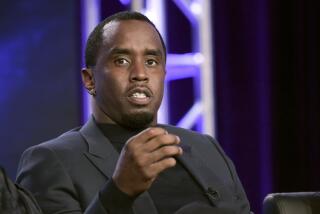Jackson Case Going to Grand Jury
- Share via
SANTA BARBARA — Prosecutors in the Michael Jackson child molestation case have decided to seek a secret grand jury indictment of the entertainer rather than proceed with a public preliminary hearing, a source close to the case said Friday.
The decision by Santa Barbara County Dist. Atty. Tom Sneddon carries some significant legal risks, but also would allow prosecutors to test the credibility of their key witnesses out of public view and without questions from defense lawyers.
Sneddon still could change his mind and decide that a preliminary hearing is the safest way to obtain a legal determination on whether there is enough evidence to proceed to trial, the source said. But a criminal grand jury already has been convened.
Jackson was charged Dec. 18 with seven felony counts of child molestation and two felony counts of giving an intoxicant to a minor with the intent of seducing the boy. The incidents are alleged to have occurred at his Neverland Ranch in Santa Barbara County early last year.
Citing a gag order imposed on lawyers in the case by Superior Court Judge Rodney S. Melville, Susan Tellem, whose Los Angeles public relations firm handles media inquiries for Sneddon, would confirm only that a Santa Barbara County grand jury had been convened as part of a “regular process,” as is done every three months.
“The substance of grand jury proceedings is not disclosed to the public in any case; therefore, there is no information available as to what the grand jury is hearing,” she said. “There is no more available information and, as you know, there is a protective order in place.”
Jackson’s attorney, Mark Geragos, also bound by the gag order, declined to discuss the issue. Legal experts, however, expressed some surprise that Sneddon would decide to take his case to a grand jury at this relatively late stage, rather than months ago.
“If you are going to go to a grand jury, why now and not long ago?” asked Loyola Law School professor Laurie Levenson. “There are problems in doing this now that could wind up hurting the prosecution.”
One disadvantage, Levenson said, is that the prosecution may not have had time yet to fully grasp the extent of the evidence it has collected. In a grand jury hearing, prosecutors are obligated to tell the defense about anything they have that could help the defense. That could become an issue for a defense appeal, she said.
The advantages of using a grand jury include keeping secret some evidence that might be damaging to the defense, giving key prosecution witnesses a low-pressure opportunity to testify without defense cross-examination and reducing some of the “political heat” on Sneddon if grand jurors say the case is too weak to take to trial, Levenson said.
An April 2 hearing has been set by Melville in the north Santa Barbara County city of Santa Maria, where the Jackson case is being heard, primarily to set a date for a preliminary hearing. But there has been widespread speculation since Jackson’s arrest that the preliminary hearing might ultimately be discarded.
One of Sneddon’s concerns is avoiding a “media circus” at a public preliminary hearing, one official said. But others questioned whether that concern was a valid reason to risk the possible legal repercussions of a belated move to the secrecy of a grand jury.
Michael C. Mahon, former president of the California Public Defenders Assn., spent 22 years as a public defender in Santa Barbara County and is now chief deputy public defender in Ventura County. He said the grand jury route could be a major gamble.
“One judge up there has already declared the entire jury selection process in Santa Barbara County unconstitutional on grounds that it is a kind of volunteer system that does not produce proportional representation for Latinos and other minorities,” Mahon said. “That issue is now before an appeals court.”
“It certainly could be extended to grand jury selection,” he said, adding that he was surprised Sneddon “would hand the defense an appeal issue on this.”
Mahon and Levenson also noted there have been concerns about the health of the alleged victim, a cancer patient.
Because of a recent U.S. Supreme Court decision, they said, the prosecution could encounter serious problems if the boy died before Jackson went to trial, they said.
The court ruled that grand jury testimony of a witness who subsequently died could not be introduced as evidence during trial, because the witness had not been subject to cross-examination. If a witness dies after testifying at a preliminary hearing, the testimony is allowed during trial.
“I can’t imagine he would risk that if there is any significant risk at all to the boy’s health,” Mahon said.
USC law professor Erwin Chemerinsky said that taking the case to a grand jury would preserve Sneddon’s control and minimize publicity. But he also will miss the opportunity of testing prosecution witness testimony under fire, Chemerinsky said.
More to Read
Sign up for Essential California
The most important California stories and recommendations in your inbox every morning.
You may occasionally receive promotional content from the Los Angeles Times.













